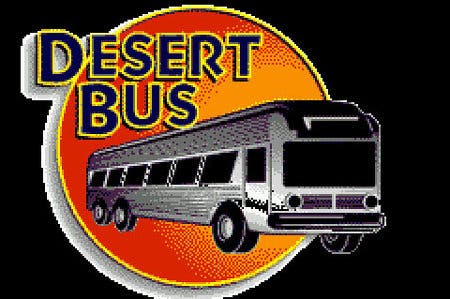Retrospective: The Cult of Desert Bus
Coach party.
"It's the worst videogame ever made."
That's the verdict on Desert Bus by LoadingReadyRun, the group behind the hugely successful Desert Bus for Hope annual charity event. And these guys should know, having endured endless hours behind the wheel of the bus since the first marathon session was staged in November 2007 in aid of the Child's Play charity.
Desert Bus is boring, annoying, unrewarding and ridiculous. It's also oddly captivating.
If you've never heard of the game before then I'm afraid there's no high-level concept I can use to describe it. Desert Bus is not some of this game mixed with bits of that game. You could perhaps say it's a bit like 70s road movie Vanishing Point only slower, and without cops, drugs and nude motorcycle girls. Okay, it's nothing like Vanishing Point.
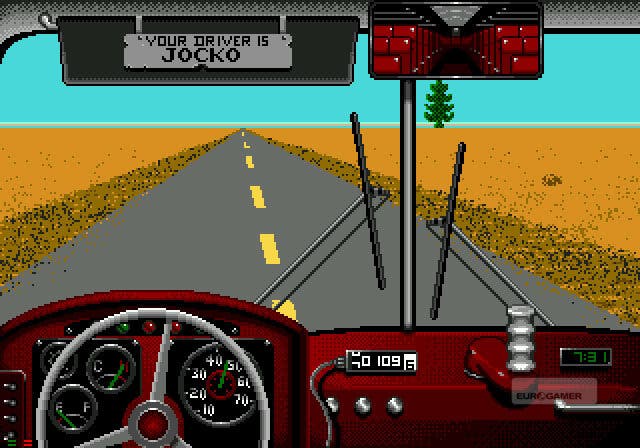
The idea is to drive an empty bus from Tucson, Arizona to Las Vegas, Nevada - in real time. The distance is 360 miles and as your vehicle's maximum speed is 45mph, it takes at least eight hours to complete the journey. That's eight hours of continuous driving as there's no pause button. You can pull up at the side of the road but within seconds the engine temperature starts to rise. And should it overheat, the bus breaks down and you have to wait to be towed all the way back to Tucson - in real time of course.
But driving games are fun, right? Even simulators. Well not this one. For a start you're driving along a road that makes the M25 motorway look like Over Pass City from Rage Racer. It's completely straight with no hills or dips. Scenery is limited to the odd dead tree or bush that drifts by as you trundle on. Your bus is fitted with a horn, although it's a bit pointless as you never encounter any other vehicles.
With no traffic or bends, the temptation is there to just tape down the accelerator button and let the bus autopilot its merry way to Las Vegas. Only the developers expected this, so the bus veers slightly to the right meaning that you have to keep correcting its line. If you accidentally drive off the road, the bus gets stuck in the sand and you're towed back to the beginning.
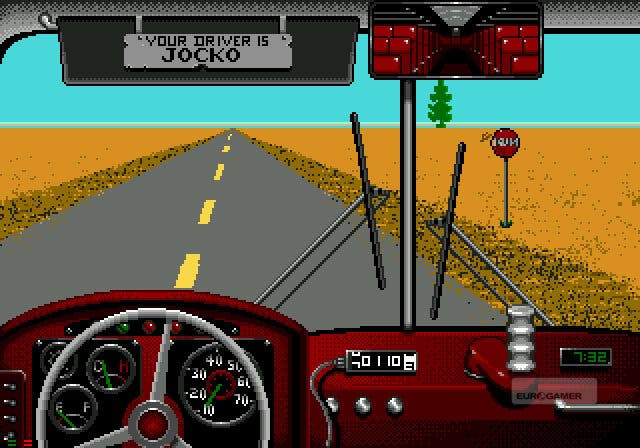
There's no fanfare should you make it all the way to Vegas. You don't see the city skyline shimmering on the horizon. Instead, the bus just stops dead. The eight hours you've invested is rewarded with a single, miserable point and you're invited to drive back to Tucson. The game just then loops and you can continue to drive back and forth until seizures start to kick in.
Desert Bus is obviously a joke. It was originally included as one of several 'scam' mini-games on Penn & Teller's Smoke and Mirrors, a multimedia offering originally developed for the Sega Mega-CD by the wacky duo themselves and Barry Marx (the Desert Bus idea is actually credited to TV and radio producer Eddie Gorodetsky). The concept was that the game's owner would be in on the various jokes so they could trick their hapless friends. With Desert Bus you can imagine the unwary driver being told "There's a rest stop just up ahead" and "A prop plane with chorus girls dancing on the wings flies past at the hour mark".
Smoke and Mirrors was finished and due out in 1995 but the release was canned as publisher Absolute Entertainment went bust. A review copy of the game surfaced ten years later and was freely shared around on the Web.
I remember downloading it just for Desert Bus. It was one of those quirky games that I had to play, even if just for a few minutes. But the more I heard about the game, the more I began to contemplate a longer shift.
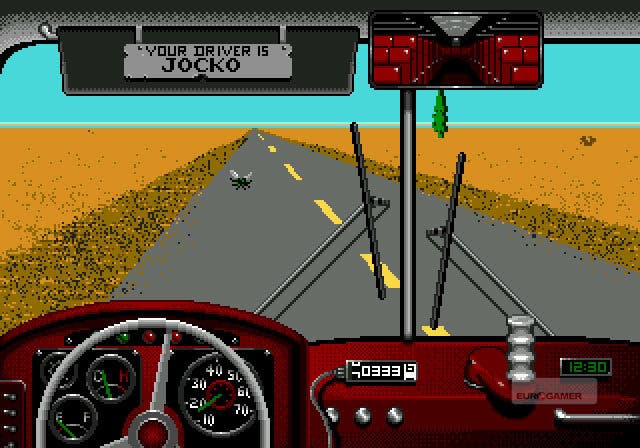
Thankfully I wasn't the only one. Willing drivers reported that a fly splats onto the windscreen at the five hour mark and that on subsequent drives, the blue sky changes to purple dusk and then black night with the bus's headlights illuminating the road.
A part of me needed to see that unfortunate fly. I figure it has something to do with playing computer games in the early 80s, when you'd spent hours shooting waves of identical aliens so that some slightly different aliens would appear, or waste days exploring a tedious maze to find the poorly-depicted treasure that was hidden within. Seeing these little things that programmers had tucked away in their lines of arcane code was very important, even if it was just a hollow 'Congratulations' message at the end of the game or, as I'd discover in Desert Bus, the offer of some overtime behind the wheel.
It seems that the creators actually expected people to complete the journey as the game was to include a competition where players who had earned at least one point could win a real Desert Bus ride with Penn and Teller. Obviously the trip would be slightly more enjoyable that the virtual version and, on arrival in Vegas, the winners would get to visit various shows. Penn Jillette has since said that they'd hoped groups of people would take turns clocking up a stupid number of hours. And that's exactly what's happened with Desert Bus for Hope.
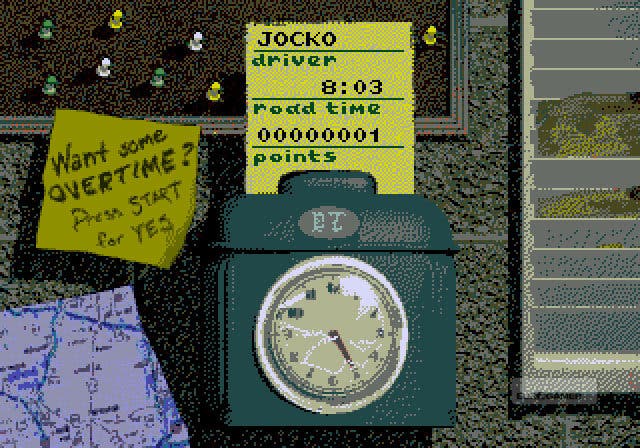
Now in its fifth year, the annual fundraiser has to date raised more than $800,000 for the Child's Play charity. The LoadingReadyRun guys play for as long as donations continue to come in, and this year they bussed for a total of six days and six hours.
This year's event also saw the release of Desert Bus for iOS and Android devices, with the proceeds raised going to the charity. If you're eager to experience the abstract thrills of Desert Bus - or more likely just want to push a small amount of money the charity's way - then you know what to do.
For the Child's Play organisation and those that benefit from its work, Desert Bus might just be the best videogame ever made.
